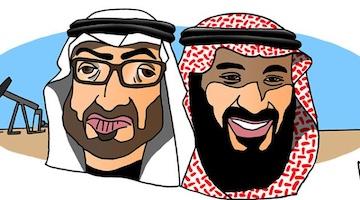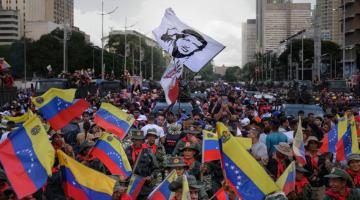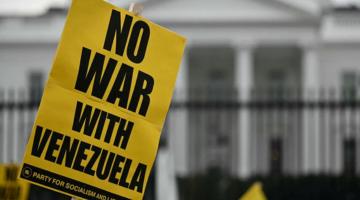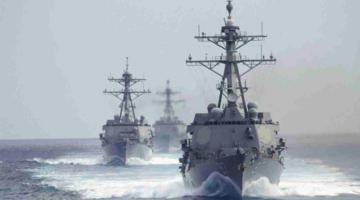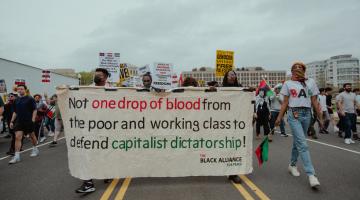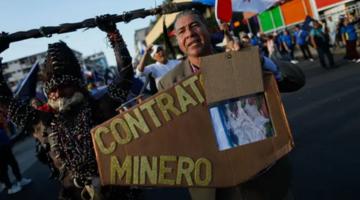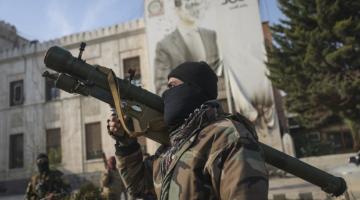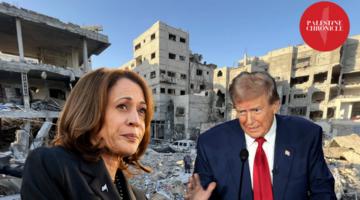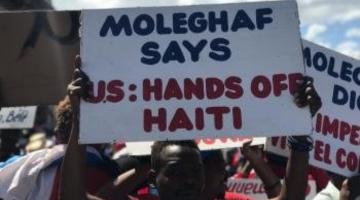Historian Jeff Pearce, @jeffpropulsion, responding to the atrocity reports of Alula Solomon, @Alula_Solomon, CEO, Tigrai Media House
US hostilities towards Ethiopia and Eritrea look more and more like those preceding US wars in Yugoslavia, Libya, and Syria, writes Ann Garrison.
On May 20, the US Senate passed Senate Resolution 97 "calling on the Government of Ethiopia, the Tigray People's Liberation Front, and other belligerents in the conflict in the Tigray Region of Ethiopia to cease all hostilities, protect human rights, allow unfettered humanitarian access, and cooperate with independent investigations of credible atrocity allegations." The resolution also called on neighboring Eritrea to withdraw troops from Ethiopia.
On May 21, Cameron Hudson told Foreign Policy, “This is a major strategic shift in the Horn of Africa, to go from an anchor state for U.S. interests to become a potential adversary to U.S. interests.” Hudson self-describes on Twitter as former CIA, State Department, and White House staff, now with the Atlantic Council.
On May 23, US Secretary of State Anthony Blinken issued a statement announcing sanctions on both Ethiopia and Eritrea, including official travel restrictions and aid cuts, most of which targeted Ethiopia, which receives the largest share of US aid in Sub-Saharan Africa.
On May 24, Ethiopia responded angrily with their own statement, saying, “As the Ethiopian Government has made it clear, time and again, the attempt by the U.S. administration to meddle in its internal affairs, is not only inappropriate but also completely unacceptable. Ethiopia should not be told how to run and manage its internal affairs.”
On the same day, the Telegraph published “Exclusive: Ethiopians suffer horrific burns in suspected white phosphorus attacks,” citing anonymous “leading chemical weapons experts” who had “evaluated footage” from Tigray. The publication acknowledged, “The UN and other bodies were called to investigate. But nobody would, and nobody condemned its use because it’s very hard to prove it was used with ‘intent’ against people."
International law allows for the use of white phosphorous to illuminate the battlefield at night or to provide tactical smoke screens, but the United Nations’ Geneva Conventions classify its use to harm civilians as a war crime.
We all know this playbook
We all know this playbook. The US and its ancillary powers and publications allege atrocities, usually in the Global South, then claim to be the exceptional arbiters of peace, justice, and human rights for the entire world. Jeff Pearce, who identifies on Twitter as “historian, novelist, career surrealist,” wasted no time responding to the unsubstantiated white phosphorous alarms with a sardonic analysis on his Medium blog: “Ethiopia: Manufacturing More Outrage.”
Pearce’s blog and Twitter page are a hilarious running commentary on the demonization of Ethiopia and Eritrea, and I recommend them to anyone trying to keep up with this. Recently he tweeted, “They keep telling me the earth is flat, and they’re going to push this African country off the edge to prove it.”
I asked Pearce if I could use the above screenshot from his Twitter page with this article, and he responded:
“Sure, but could you please mention that I'm the author of a book on Ethiopian history, Prevail: The Inspiring Story of Ethiopia's Victory over Mussolini's Invasion, 1935-1941? This is because folks are quite entitled to wonder why anyone should listen to this bald, white doofus about African affairs.
“And the other thing that you may wish to mention is that I've written articles on Medium that have investigated the Axum Massacre, the Mai Kadra Massacre, and United Nations officials allegedly threatening Ethiopian aid workers, and that none of the mainstream news operations have bothered to pick up or check any of these stories, even though they are clearly taking some cues and tips from social media.
“While this last bit may sound self-serving, frankly, it's downright damn appalling that NONE of these stories are being pursued with proper investigative zeal.
‘Their mainstream narratives are treated as already established facts. Same with the white phosphorus story in the Telegraph, for which, if you actually go over the details, nothing is proved at all yet.
“All that Ethiopians have been asking for is BALANCED coverage and not to be penalized in the international community, which is relying on a version of events put forward by a terrorist organization/criminal oligarchy, the TPLF.
‘They deserve far better than this.”
Indeed. And we know that in instances including Yugoslavia, Libya, and Syria, these fabulist human rights campaigns are often followed by US/NATO bombing, asset seizures, international criminal indictments and arrests, CIA-engineered coups, proxy wars, and/or occupation. The US leads the world in creating chaos in the name of human rights.
The US is scrambling to regain control of the Horn of Africa
I spoke to Eritrean American medical doctor Simon Tesfamariam, as I did in March when the EU imposed new sanctions on Eritrea. Tesfamariam lives in New York City, but he has a long history of organizing and activism within the global Eritrean community. He has lived and worked in Eritrea, volunteering in Eritrean hospitals and lecturing at the University of Asmara. He says that the US counted on the Tigray People’s Liberation Front, commonly known as the TPLF, to control Ethiopia and thereby the Horn of Africa for 30 years, but it’s struggling to regain control now that the TPLF is out of power in Addis Ababa, Ethiopia’s capital.
Simon Tesfamariam: America basically bet on the TPLF to maintain control of the Horn of Africa, but the TPLF rule was repressive, based on tribalism, and it built up resentment throughout the country until the people removed them from power in 2018. Now America’s scrambling to figure out how to regain control.
Ann Garrison: What do you mean when you say that the US used the TPLF to control the Horn? What sort of control did they exert that benefited US interests?
ST: Prior to 2018, TPLF was, first, what we call a puppet or client regime for Washington.
Second, TPLF was a minority regime in that it preferentially represented the interests of the Tigrayan people, which make up only six percent of the Ethiopian population.
Third, TPLF was a bourgeois nationalist regime in that it only represented a small group of Tigrayans. Over the last three decades, the US showered the tribalist, bourgeois TPLF minority regime with roughly a billion dollars a year in aid under the guise of humanitarian assistance. (This is generosity akin to that the US shows to Egypt and Israel, which respectively receive $1.5 and $3 billion annually). In exchange, TPLF served as Washington's policeman in the Horn of Africa and used its influence in the African Union, which is based in Addis Ababa, to protect Washington's interests on the African continent. Think about that for one minute: one six-percent minority tribe in Ethiopia was exercising that much power over the whole of Africa.
More than anything, the US seeks to control the Horn militarily and strategically. Resource acquisition is secondary. Thus, with undue power and influence, the US-backed TPLF illegally invaded both Eritrea and Somalia in 1998 and 2006, respectively, to bring those countries under US control.
Then, when Eritrea stood up for the Somali people by opening its doors to all the exiled Somali political leaders who were looking to unite to expel the TPLF-led Ethiopian invaders, it was denounced by the US as a "spoiler" in the Horn, accused of militarily supporting Al-Shabaab, and consequently sanctioned in 2009.
TPLF committed unspeakable war crimes against the Somali people, even using white phosphorus bombs on the civilian population.
Let's also not forget about TPLF's war on Eritrea from 1998 to 2000, under the guise of reclaiming the supposedly contested border town of Badme.
AG: I’m glad you brought that up. Badme seems to be a nowhere desert town with nothing to fight for on the border of Eritrea and Ethiopia’s Tigray Province. So I guess it was just an excuse?
ST: Yes. And during this totally unnecessary war, TPLF sent to their death hundreds of thousands of mostly ethnic Oromo peasants as "minesweepers" barbarically launched in human waves against the Eritrean Defense Forces. This reveals the class-based and tribalist nature of TPLF. Anyone who doubts this, should read the groundbreaking 1999 article by David Hirst, who wrote about this in the Guardian back when it was still a somewhat progressive paper. In that article he wrote:
"It was Oromo peasants it [the TPLF] selected as human minesweepers, and Tigrayan officers who shot them from the rear. Yet it showed hardly less contempt for its own people. Local Tigrayan villagers were pressed into that suicidal baggage train, and mainly Tigrayan soldiers died in the tanks that were entrusted to no other nationality."
During the so-called border war, TPLF also ethnically cleansed Ethiopia of almost 80,000 Eritreans living there on account of the "color of their eyes" and then seized their assets. TPLF would go on to do to Ethiopians themselves what it had already done to Somalis and Eritreans—invade their lands, ethnically cleanse innocent people, and seize their resources.
The US not only turned a blind eye to TPLF's crimes against innocent Ethiopians, Somalis and Eritreans and provided them international cover, but also actively took a hand in supporting TPLF in their assault on the peoples of the Horn.
The US integrated TPLF's security architecture with its own. It has sent drones, armaments, and troops to Somalia, but, interestingly, 80 percent of US weapons ultimately end up in Al-Shabaab's hands. This has kept Somalia weak in a "forever war" and essentially rendered it a US colony.
The US also pursued a hostile isolation strategy against Eritrea and sought to implode its economy. However, Eritrea survived and became the final bastion of resistance in the Horn. To put it simply, the Eritrean state and its defense forces served as the primary obstacle to Washington's total control of the Horn through its TPLF puppet regime. It is the only African country still refusing to collaborate with AFRICOM, the US Africa Command.
AG: Has anything changed in Ethiopia's posture toward the US aside from its alliance with Eritrea?
ST: Yes, Ethiopia is boldly asserting its sovereignty in defiance of Washington. When you consider TPLF's 27 years of neocolonial servitude to Washington, the mere assertion of sovereignty alone is revolutionary. Lately, America has done a lot of "urging" and expressing "concern" every time Ethiopia does something it doesn't like. We’ve heard a lot of this from Blinken in regards to Tigray. But Ethiopia refuses to submit. Instead, it continues on its own sovereign path.
At one point, Trump threatened to "blow up" Ethiopia's Grand Ethiopian Renaissance Dam (GERD) through its Egyptian allies because Ethiopia refused to bend to his will. Instead of backing down, Ethiopia is moving forward with filling its dam.
When Washington's EU allies threatened to cut off roughly $100 million in aid if it didn't commit to a ceasefire that would largely benefit the terrorist TPLF forces, Prime Minister Abiy responded—to the shock of many Westerners—by saying, "threatening Ethiopia for coins will not work." When Blinken pressured Abiy to force Eritrean troops to leave Tigray in February, Abiy followed by publishing an article in Project Syndicate that established his new doctrine—the Abiy Doctrine—that a “New Ethiopia” will push for regional integration among neighbors with which it is “inseparably linked”:
“An Ethiopia free of the TPLF will champion peace and inclusive development. Internally, our ‘New Ethiopia’ will be based on equality among all of our constituent groups, including the suffering people of Tigray. Externally, we will act in a way that recognizes that our national interests are inseparably linked to those of our neighbors.”
AG: In January 2021, Global Firepower released a ranking of 140 militaries with the most power to wage conventional war. It ranked Ethiopia 60th in the world and sixth in Africa, with 140,000 troops in a population of 12 million, and 2 million people reaching military age annually. Ethiopia also contributes more troops to UN Peacekeeping Missions than any other nation in the world, so this represents a major disruption of US strategic and military alliances in the Horn and in Africa.
Eritrea's military is, however, ranked 134th of 140 nations overall, and 33rd of 36 African nations that Global Firepower bothered to rank. It seems to have 200,000 active duty soldiers in a population of about 3.5 million, but it has nothing like the weaponry that the US has bestowed upon the Ethiopian army. Why is the US so irked by Eritrea and now by Ethiopia's alliance with Eritrea?
ST: Eritrea follows its own progressive developmental model based on self-reliance and socioeconomic justice and does not submit to Washington's diktats. Basically, it rejects the sort of neocolonial, neoliberal model that has led to the super-exploitation of Africa by Washington, Brussels and other predatory powers. Eritrea, a nation of fewer than 5 million people, is, like Cuba, an example that Washington finds intolerable.
Ethiopia's alliance with Eritrea and increasingly bold defiance of the West suggests the formation of a new resistance bloc in the Horn of Africa.
Add in Somalia under the leadership of Farmaajo and you have potential resistance spanning from the Red Sea to the Indian Ocean and down into the interior of Africa. In January 2020, Eritrea, Ethiopia and Somalia signed an agreement to form a tripartite alliance. Looking at a map, their close proximity to one another and situation near coast lines shields and insulates them from cross-border threats. If they can continue the current course and shield off Washington, one can only imagine what this means for Africa. The implications are enormous. Will we finally be talking of a genuine African resistance bloc?
AG: It seems that Ethiopia's border war with Eritrea was really a war between Tigray and Eritrea prosecuted because the TPLF were in power. Eritreans and Tigrayans both speak Tigrinya, so they must share history, however distant, that made them one people at some point in time. What's the story of that fracture?
ST: First, Eritrea is a multi-ethnic state with no official language but rather nine different languages spoken by different ethnic groups. Tigrinya just happens to be commonly used as a working language given that Tigrinyas make up roughly 60 percent of the population.
Second, it's important to note that the 1998-2000 war was the TPLF’s irredentist regime change war against Eritrea’s People's Front for Democracy and Justice (PFDJ) government. The TPLF were trying to reverse Eritrean sovereignty and capture Eritrean land, so as to have access to the sea. This plan to expand Tigray's borders to reach the Red Sea has its roots in British meddling in the 1940s and was officially pursued by TPLF in 1976 after it published its manifesto calling for the formation of a "Greater Tigray," which was not unlike the old "Eretz Yisrael" claims for Biblically established land title. That manifesto also stated that secession from Ethiopia was among its goals. It does not represent the ambition of the average Tigrayan peasant but rather the aspiration of the TPLF elite and their brand of bourgeois nationalism.
After 2000, the so-called border war morphed into an outright war of attrition—a war to the death. Either TPLF would fall or PFDJ would fall. This is due to the fact that TPLF's raison d'etre, as outlined in its 1976 manifesto, was to expand into and capture Eritrea, which is impossible given everything the Eritrean people sacrificed to achieve independence.
Again, this is not the aspiration of the Tigrayan people. There may be some sympathizers in Tigray, but the average Tigrayan, when pressed, would not be on board with this agenda. If the TPLF were removed from power, the relationship between the Tigrayan people and Eritrean people could finally begin to be reconstructed and reconciled on the basis of their shared ancient history.
AG: Samantha Power, Obama’s UN Ambassador and now Biden’s USAID chief, and one of the main architects of the US/NATO War on Libya, has been alleging Ethiopian and Eritrean army atrocities in Ethiopia’s Tigray Province, as she did prior to US military action in Yugoslavia, Libya, and Syria. Some on the US left, including prominent Black Lives Matter activists, young anarchists, and Democracy Now, have given some credence to Power’s argument. Democracy Now has relied heavily on London-based Sudanese CNN correspondent Nima Elbagir as a source.
Have you made any effort to reach out to Democracy Now or any of these young activists with the Ethiopian and Eritrean side of this story?
ST: We’ve made efforts to reach out to many forms of progressive media, including Democracy Now and outlets further to the left, but the response has been abysmal. Why progressives and leftists remain silent is truly confounding. I don’t think they truly understand what is at stake here. Eritreans and Ethiopians have been protesting together around the world, which is truly a sight to behold, especially in light of their long history of Western-manufactured hostilities.
We need regular, daily coverage of this matter as things are escalating quickly. The US is becoming increasingly desperate and seems to be following the Libya playbook that led to the invocation of “Responsibility to Protect” and the no-fly zone under the guise of opening up humanitarian access. They could do the same to Eritrea and Ethiopia.
However, the world is very different in 2021 than it was in 2011. It’s more of a multipolar world. There’s social media to challenge mainstream media narratives. Also, the highly mountainous Eritrea is no cake walk, and the Eritrean people, who are highly unified at home and abroad, have been mobilized and vigilant for this type of eventuality since 1998.
The Ethiopian people are also following suit, with Ethiopia quickly training conscripts in preparation for whatever is to come. It will be hard to justify intervention against Eritrea and Ethiopia. You can’t conceal a US and/or EU intervention. Publicity will only lead Western audiences to start reading more about Eritrea and Ethiopia, which will lead them to see the unbelievable absurdity of the lies by journalists like Nima Elbagir. Because of the West’s racism and disregard for Black Africa, they were sloppy with their lies, which are out in the open, extremely absurd and obvious. Hopefully, it will only be a matter of time before leftists, progressives, and even liberals see what’s really going on.
Dr. Simon Tesfamariam is an Eritrean American medical doctor, writer and activist living in New York City. In 2013, Black Agenda Report published his essay “Human Trafficking and the Human Rights Agenda Against Eritrea."
Ann Garrison is an independent journalist based in the San Francisco Bay Area. In 2014, she received the Victoire Ingabire Umuhoza Democracy and Peace Prize for promoting peace through her reporting on conflict in the African Great Lakes Region. Please help support her work on Patreon. She can be reached on Twitter @AnnGarrison and at ann(at)anngarrison(dot)com.

